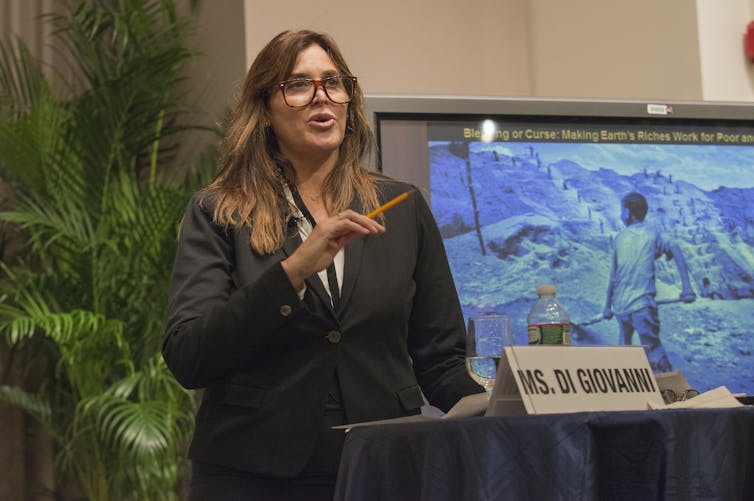In the hard-nosed world of journalism, admitting to suffering from Post-Traumatic Stress Disorder (PTSD) has traditionally been taboo – a sign of weakness never to be admitted to colleagues in the newsroom where the remedy was often a stiff drink or two. Despite repeated efforts over the past decade to draw attention to the dangers of mental illness faced by foreign correspondents, that stigma has not gone away.
It can only be hoped that may change now that one of the BBC’s most high-profile correspondents, Fergal Keane, has shared publicly the PTSD he has been tussling with privately for several years.
The BBC announced that after decades of covering conflict, its veteran war reporter would be changing his role from that of Africa editor to “further assist his recovery”. The corporation’s head of newsgathering, Jonathan Munro, said: “It is both brave and welcome that he is ready to be open about PTSD.”
Keane is not the first correspondent by any means to have shared in public the impact that covering a relentless diet of conflict, crisis and disaster can have on even the most resilient human being. His BBC colleague Jeremy Bowen, Middle East editor, spoke about his own diagnosis of PTSD in 2017, characterised by bouts of depression related to his work.

World Bank Photo Collection, CC BY-SA
Renowned foreign correspondents such as Janine di Giovanni have also written movingly about the effects of PTSD. In her 2011 memoir, Ghosts by Daylight, she confessed that crisis had become normality and “this real life, with all its sharp edges was terribly difficult”.
Combat fatigue
Almost two decades ago, research by South African psychologist Anthony Feinstein underscored the importance of efforts to introduce structured trauma training and counselling into news organisations. His first major study of 140 war journalists published in 2002 found that they had significantly more psychiatric difficulties than journalists who did not report on war.
In particular, the lifetime prevalence of PTSD in journalists who cover war was similar to rates reported for combat veterans, while the rate of major depression exceeded that of the general population. In 2018, Feinstein conducted a retrospective study of PTSD data collected over 18 years from journalists who have covered conflict across four continents.
Between 1999 and 2017, data had been collected from 684 journalists covering stories ranging from the 9/11 attacks and the Arab Spring to drug wars in Mexico and the refugee crisis in Europe. The data showed that the majority of the correspondents did not display prominent symptoms of PTSD at any one moment in time. But over a longer time-frame (many correspondents were spending well over a decade covering conflict) the data confirmed that rates of the full PTSD syndrome can approach those experienced by those engaged in actual combat – and he cautioned that news organisations could not afford to be complacent when it came to their duty of care.
Raising awareness
Large news organisations such as the BBC and Reuters have made great strides in recognising the issues associated with PTSD and providing both training and support. This has been reinforced by the work of a US-based global charity, the Dart Centre for Journalism & Trauma which offers a range of best practice guidelines and resources to safeguard the mental well-being of journalists.
This is not just about those on the frontline of foreign reporting. Almost every journalist will end up covering traumatic news events in their career – whether this be sexual violence, traffic accidents, or criminal trials. Most recently, there is a growing awareness of the dangers posed to journalists in the newsroom monitoring incoming, raw user-generated content from the sites of conflict, terror and disaster worldwide – what has been dubbed the “[digital frontline]”.
It is a point that was highlighted in a 2015 survey by Eyewitness Media Hub. This major study on the issue surveyed 122 journalists around the world and concluded that:
Office-bound staff who used to be somewhat shielded from viewing atrocities are now bombarded day in and day out with horrifically graphic material that explodes onto their desktops in volumes, and at a frequency that is very often far in excess of the horrors witnessed by staff who are investigating or reporting from the actual frontline.
Slowly but surely, journalism courses at universities in the UK are becoming aware of the importance of trauma training before students enter this professional environment. We would like to think that the work we are doing at Bournemouth University through both education, research and professional practice – in conjunction with the Dart Centre, BBC and others – is starting to make a difference.
The aim is to create an awareness of how people caught up in traumatic news might react and how to conduct ethical interviews with victims and survivors of trauma. In addition, we feel it is only responsible to make our journalism students aware of the mental stresses that journalists are exposed to whether on the frontline or in the newsroom.
Coping strategies
That doesn’t mean we should assume that every journalist who covers a distressing news story or handles sensitive material will develop PTSD. But it is important to do our best to build resilience and develop coping strategies so that journalists can bounce back stronger from the impact of covering distressing news.
As Keane’s case illustrates, PTSD can often present itself long after events. He has spoken and written about the effects that covering the 1994 Rwanda genocide had on him. It can only be hoped that the courage Keane has displayed in moving himself away from the frontline will send a signal that it is acceptable to recognise mental health issues in journalism.
Far from turning his back on the profession, according to the BBC he intends to “continue to provide original and compelling journalism” and hopes to draw on his experiences to guide and nurture young journalists. This can only be positive for the next generation of journalists.![]()
Stephen Jukes, Professor of Journalism, Bournemouth University and Karen Fowler-Watt, Senior Principal Academic, Centre for Excellence in Media Practice (CEMP), Bournemouth University
This article is republished from The Conversation under a Creative Commons license. Read the original article.
 Floods and PTSD in India
Floods and PTSD in India BU Trauma and Journalism panel at The Freud Museum, Friday, 27 May, 6.30-8pm, Tickets still available!
BU Trauma and Journalism panel at The Freud Museum, Friday, 27 May, 6.30-8pm, Tickets still available!










 Dr. Ashraf cited on ‘Modest Fashion’ in The Guardian
Dr. Ashraf cited on ‘Modest Fashion’ in The Guardian NIHR-funded research launches website
NIHR-funded research launches website Academics write for newspaper in Nepal
Academics write for newspaper in Nepal New paper published on disability in women & girls
New paper published on disability in women & girls Global Consortium for Public Health Research 2025
Global Consortium for Public Health Research 2025 MSCA Postdoctoral Fellowships 2025 Call
MSCA Postdoctoral Fellowships 2025 Call ERC Advanced Grant 2025 Webinar
ERC Advanced Grant 2025 Webinar Horizon Europe Work Programme 2025 Published
Horizon Europe Work Programme 2025 Published Horizon Europe 2025 Work Programme pre-Published
Horizon Europe 2025 Work Programme pre-Published Update on UKRO services
Update on UKRO services European research project exploring use of ‘virtual twins’ to better manage metabolic associated fatty liver disease
European research project exploring use of ‘virtual twins’ to better manage metabolic associated fatty liver disease